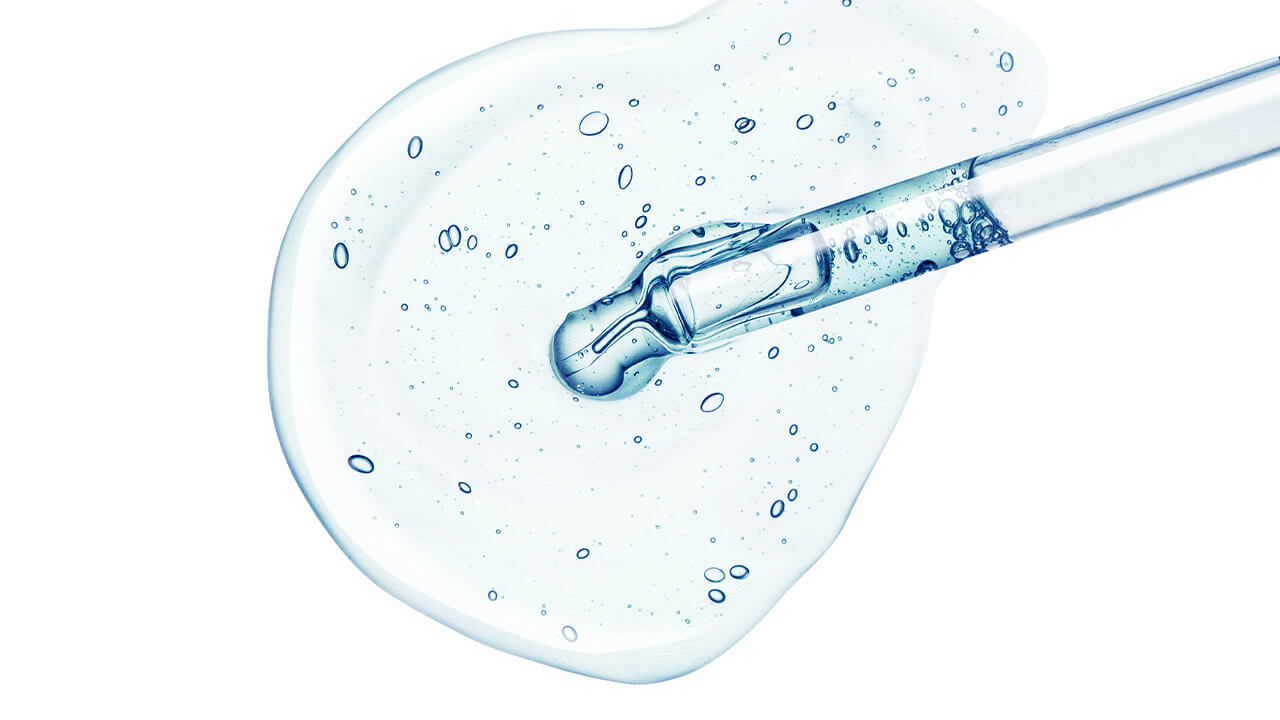What helps prevent a dry scalp?
Hair care with hyaluronan helps prevent itchiness and a feeling of tightness
A dry scalp is unpleasant: it feels tight and itchy - some small white flakes might already be visible on the hairline. It is caused by a damaged lipid film. The scalp urgently needs gentle care and a moisture boost to rebalance!
An old friend from hair care will bring natural relief: hyaluronic acid. In this article you will discover what else is important when choosing a shampoo and what you can do about a dry scalp yourself!
Care for a dry scalp and dry hair
The simplest way to get on top of a dry and itchy scalp is hair care that is matched to your needs. Lots of people grab an anti-dandruff shampoo first. But they are usually designed for problems with greasy dandruff and dry the scalp and hair out even more.
Shampoo for a dry scalp: that’s the key
When you have a dry scalp, a moisturising shampoo is a must! But finding the right product is not so easy - the choice at the chemists is so huge and what the scalp needs varies from person to person.
To nourish a dry and itchy scalp, the shampoo needs to have the following four characteristics:
1. Gentle cleansing
The main task of any shampoo is to clean the scalp. This is what surfactants are for because they remove dirt and debris from the skin. When the scalp is dry, a mild shampoo should be used that doesn’t strip any more grease and moisture from the skin. The best surfactants are based on sugar and coconut - also called coco glucosides.
2. No silicone
Silicones have the job of making hair shiny and soft. However, they can also be deposited on the scalp, clog the pores and therefore disrupt the natural moisture balance. A silicone-free shampoo is therefore more suitable for a dry scalp.
3. Strengthening the skin barrier
Since a dry scalp is very often itchy too, soothing and anti-inflammatory active ingredients can ease the itchiness. For example, allantoin has a soothing effect and is well tolerated, even by sensitive skin. Tocopherol (vitamin E) is an antioxidant which protects the skin from harmful environmental effects and stimulates cell regeneration.
4. Moisturising
There are some ingredients which help to retain moisture on the scalp and protect it from drying out any further. As well as hyaluronan, these also include glycerine, panthenol, aloe vera and urea. However, hyaluronic acid is the undisputed number 1 when it comes to moisturising. Just one gram of this active ingredient can store up to 6 litres of water. Another benefit: since hyaluronic acid also occurs quite naturally in our skin, there are virtually no known allergies or side effects from hyaluronic shampoo.
Extra nourishment with the right conditioner
The general principle is that a conditioner should only be used on the lengths of your hair. However, this maxim doesn’t apply to a dry scalp - at least, if the conditioner meets certain requirements.
When your scalp is healthy, using shampoo is sufficient. Since it is kept supple by the lipid film and sebaceous glands, a conditioner would over-treat it. Then it supplies an unnecessary amount of grease to the hair through the day, which soon makes the hairline look oily.
When your scalp is dry, there are not enough lipids there. As a result, your hair quickly becomes dull and straw-like. A silicone-free conditioner with nourishing active ingredients therefore doesn’t just care for dry lengths and ends, but also a dry scalp.
Tips for your hair care routine if you have a dry scalp
Each one of us has our own personal routine when it comes to scalp and hair care. But some habits can contribute to the scalp drying out. It’s worth taking a look at your own routine to avoid possible triggers.
Wash your hair less often
Water can dry your skin out. Especially when your skin frequently comes into contact with water, it is softened again and again and so-called natural moisturising factors (NMF) are rinsed out.
If possible, the gaps between hair washes should be lengthened if you have a dry scalp.
But you don’t have to stop washing your hair altogether. Regular cleansing is necessary to remove buildup from the scalp so it can breathe.
Watch the water temperature
In the winter especially, lots of people find a hot shower is a real treat. But unfortunately, we’re not doing our scalp any good. When the water temperature is over 39 degrees Celsius, lipids are released from the skin and the scalp dries out even more.
It is better to turn the temperature down a little and just wash your hair in lukewarm water.
Avoid heat
Also when styling, the important thing is not to expose the scalp to too much heat. When you use a hair dryer, make sure you hold the nozzle far enough away from your head and select a low setting.
You should also only use styling tools like straighteners and curling tongs very carefully and as infrequently as possible.
Massage, don't scratch
A dry scalp often has an annoying companion: itchiness! If you scratch, it actually makes the problem worse in the long run because the skin can easily become damaged. Consequently, it dries out even more or in the worst case scenario, become inflamed.
Finger nails on your scalp are therefore a no-no. Incidentally, the same goes for any other sharp implements such as wiry brushes or sharp combs.
An acutely itchy scalp can also be soothed by a gentle massage with the finger tips using light pressure.
Avoid dry shampoo
It might sound like a good idea to use a dry shampoo when you have a dry scalp at first. After all, it will freshen up your hairline without having to wash your hair.
Unfortunately, however, dry shampoo is not a good alternative to washing your hair if you have dry hair either. While the ingredients do extract oils from the hair and refresh a greasy hairline, lipids from the scalp are also absorbed at the same time.
Take care with anti-dandruff treatments
When your scalp is very dry, it can often become scaly as well. These scales are just small, dead skin cells, not true dandruff. The latter is usually caused by an overgrowth of a yeast on the scalp.
Most anti-dandruff shampoos are designed to get rid of these rather greasy scales. This means they would be much too aggressive for a dry scalp. You should therefore check whether an anti-dandruff shampoo is also suitable for a dry, scaly scalp.
Tips and home remedies for a dry scalp

As well as gentle, moisturising care, you can also give your dry scalp a treat with other things. You can strengthen your skin and hair from within by:
- drinking enough, especially mineral or tap water
- having a balanced, vitamin-rich diet
- treating yourself to some down time to avoid stress
There is little proof of the effects of most home remedies for a dry scalp from studies. If you would still like to make your own hair mask or scalp treatment, make sure you choose ingredients that have a moisturising effect and don’t contain any harmful substances. Some examples would be:
- good quality oils such as olive oil, argan oil or coconut oil – ideally organic
- a hair mask made from quark and honey or avocado and jojoba oil
- a head massage with egg yolk
What causes a dry scalp
A dry scalp is caused by a damaged lipid film. Like the skin on the rest of your body, the scalp needs an intact acid mantle so that it doesn’t dry out. This lipid film consists of moisture and a kind of oil, which is produced by the sebaceous glands.
Signs of a dry scalp are:
- A tight feeling
- Itchiness
- Small white flakes, which fall lightly onto your shoulders
- Dry hair, which looks dull, brittle and straw-like
In some cases, there may also be a skin barrier dysfunction. If severe symptoms occur, such as extensive flakes, scabs, extreme itchiness or large areas of redness, these might be caused by a skin disease such as neurodermatitis, psoriasis or allergies. In such cases you should seek advice from a doctor or dermatologist.

But usually it is simple everyday causes that are responsible for the lipid film being damaged and the scalp no longer being able to retain moisture. These factors can be split roughly into three categories:
1. Weather and environmental influences
- Winter: cold air outside and central heating making the air dry inside
- Summer: increased UV radiation and more sweating on the head
- Air pollution: smog, exhaust fumes and fine particles can weaken the skin barrier and also exacerbate allergic reactions
2. Internal triggers
- Skin type: dry scalp can be genetic, particularly amongst women who generally have a dry skin type
- Ageing: skin types can generally get drier with advancing age since the sebaceous glands produce fewer lipids
- The menopause: hormonal changes can have various effects on the body, including increased hair loss and the scalp being less able to store moisture
- Stress: both ongoing physical and mental stress
- Vitamin deficiency: especially vitamin A, C, E, biotin and selenium as a result of disrupted absorption of nutrients from the intestines, unbalanced or restrictive diets or because there is a greater need during pregnancy and breastfeeding or with increasing age
- Dehydration: insufficient intake of fluids over a long time or taking diuretic medication without balancing this out
3. Personal hair care habits
- Washing hair: frequent hair washing, especially with water that is too hot
- Heat tools: frequent contact with heat from a hair dryer, straighteners or curling tongs
- Aggressive hair care: use of unsuitable products with excessive cleansing such as some deep treatment and anti-dandruff shampoos
- Styling product: frequent use of hairspray, hair mousse, etc. which build up on the scalp and can dry it out
Learn more

Hyaluronan – what is this multi-talented ingredient?
Read what hyaluronan is, how it is used for skin and hair care and learn more about the benefits of hyaluronic acid in the care of your hair and scalp.

The hairoscope
Every woman wants a full head of healthy hair. There are a few things that women can do to get just this. First of all, it is important to diagnose the current state of your hair and scalp. Answer the following 15 questions and look into the future of your hair.


